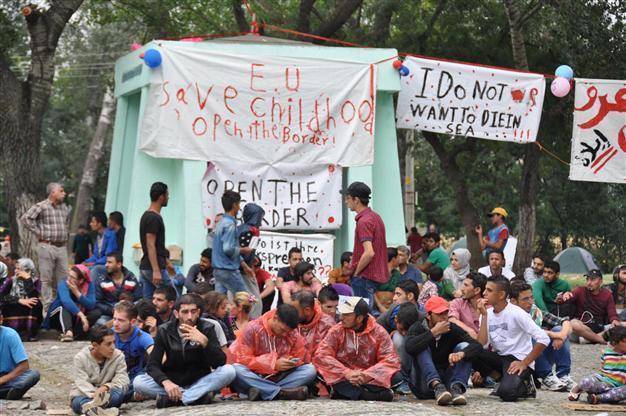Syrian migrants sit-in in second week in Turkey’s northwest
EDİRNE – Doğan News Agency

DHA Photo
Nearly 2,000 Syrian migrants have been holding a sit-in in the northwestern border province of Edirne for more than a week in the hopes of crossing to Greece, after they were prevented by security forces from traveling to European countries.
The migrants are staying outdoors at Edirne’s Sarayiçi Square, a public square popular with historical wrestling events, while warming themselves by lighting fires.
They sheltered themselves in closed areas on Sept. 21 when it was rainy in Edirne, but approached the border area early Sept. 23 in the hopes of hearing good news from the United Nations General Assembly, while reiterating their demand from Turkish authorities that they be allowed to cross the Turkish-Greek border to head for Europe.
Some of the migrants were reportedly set to spend Eid al-Adha in Edirne, while some others have been sent to provinces they came from in buses dispatched by the Edirne Governor’s Office.
The Edirne Police Department took comprehensive security measures, blocking the entry and exit to the Sarayiçi Square to prevent marches by the migrants.
Geographically located between war-torn Syria and Iraq in the southeast and the European Union member states of Bulgaria and Greece in the northwest, Turkey has come to be a transition point for foreign migrants looking to illegally cross into the EU in an endeavor to flee the violence in Iraq and Syria, as well as find a higher standard of living.
Meanwhile, the head of the EU border protection agency Frontex on Sept. 21 urged more support from member states, warning that “the speed and dynamics of the refugee influx continues to be exceptionally high.”
“What I can say with certainty is that we need more personnel support from countries – people we can deploy on the spot, and we need them now,” said Fabrice Leggeri.
Over half a million migrants have crossed the EU’s external borders so far this year, up from 280,000 in 2014, Frontex said last week.
The record influx has made clear that “we urgently need to find a common European border management,” Leggeri told Germany’s Die Welt daily and Spain’s El Pais.
